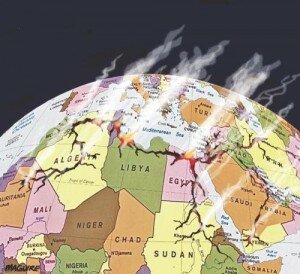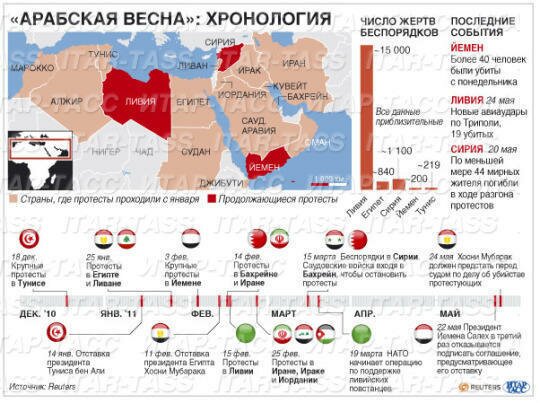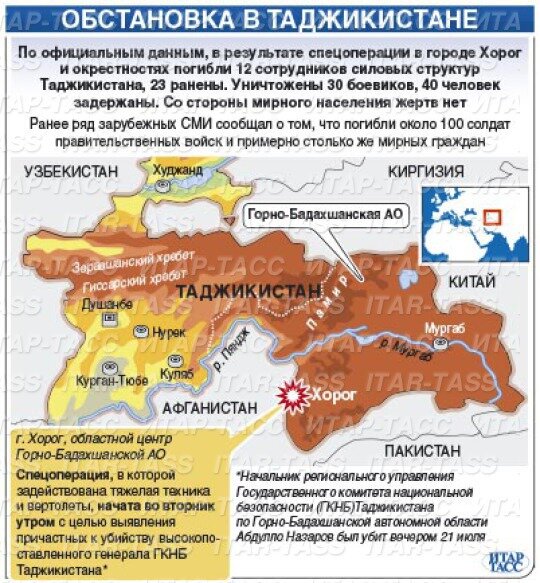
The events of the "Arab Spring" which have been taking place in the Middle East and North Africa for about three years, keep causing more and more negative consequences on both, regional and global scales. In particular, such consequences are permanent tension in Egypt, Tunisia and Libya, further aggravation of the armed confrontation in Syria, and the spread of social and political unrest to other parts of Africa, Middle East, and now already to the Black Sea region, Central Asia and Muslim areas of the Russian Federation.

|
|
Chronology of the "Arab Spring" http://www.itar-tass.com/g55/546.html |
Thus, in May of this year, under the influence of the events in Syria, was resumed the armed confrontation between supporters and opponents of the Syrian Government in Lebanon. The most violent clashes, accompanied by the victims on both sides, are taking place in the Libyan city of Tripoli.
| Who would have thought that the biggest camp of anarchists in Europe will meet in Turkey. Slogans are entirely anarchist and socialist ones http://arktal.livejournal.com/ |
However, in late May - early June this year got worsened the situation in Turkey, where began mass protests of opposition in the name of resignation of the Prime Minister of Turkey R.Erdohana, who is accused of totalitarianism and policy of Islamization of the country. In general the unrest had reached about 70 Turkish cities. During the dispersal of rallies and demonstrations by the Police, more than two thousand people were wounded and about three thousand people were arrested.
The situation in Turkey is a concern of leading countries of the world and of the Middle East region, as well as of international organizations, including the European Union, which accuses Ankara of excessive use of force against protesters, contrary to European democratic principles, which can create obstacles for the European integration of the Turkish state.
|
Map of regions of Kyrgyzstan http://ondosug.com/ |
At the same time, events of the "Arab Spring" have indirect influence also on the situation in Central Asian regions, where the activation of local opposition forces and various extremist movements is taking place. This primarily refers to sharpening of the political confrontation in Uzbekistan, restart of protests in Southern Kyrgyzstan, as well as increased anti-governmental moods among the population of mountainous regions of Tajikistan, who support the Tajik opposition.
In particular, in early June this year, took place mass protests of the Kyrgyz opposition and local population in Issyk-Kul and Jalal-Abad regions of Kyrgyzstan. In both cases, the protesters were demanding abolition of the agreements with foreign companies on development of the Kyrgyz gold deposit Kumtor, which do not consider the interests of local businesses and workers. In the course of actions of protest of the opposition in Jalal-Abad region of Kyrgyzstan, was captured the building of the regional administration, as well as was elected a new leadership of the region and city.

|
|
A map of Tajikistan showing the area of the special operation in the town of Khorog, Gorno-Badakhshan Autonomous Region http://www.itar-tass.com/g57/2646.html |
In view of the threatening nature of the mentioned above trends, governments of all Central Asian countries are strengthening measures for struggle against terrorism. In particular, in May this year, in Eastern Tajikistan and in Gorno-Badakhshan autonomous region of the country were conducted complex counterterrorism trainings of Tajik Security Forces "Security-2013" with armored vehicles, artillery and combat helicopters.
Recently, similar problems have obviously been brewing in the Russian Federation. A manifestation of this is the revitalization of Islamic extremists in the North Caucasus of Russia, which has been taking place since the beginning of the year. Thus, within the first three months of 2013, in the North-Caucasian Federal District of Russia there had been over 120 crimes of terrorist nature, including 15 explosions and 35 firings. The objects of criminal attacks were law enforcement officers, government officials and businessmen.
|
Chaos in the North Caucasus http://www.aif.ru/society/article/54367 |
In April and May this year the situation in the North Caucasus has become even sharper. In fact, there restarted almost daily armed clashes of units of security forces with militants, which are accompanied by victims from both sides. The most resonant character had terrorist attacks in Makhachkala, namely two car bomb explosions on the 20th of May this year (killed 4 and injured 46 people) and undermining suicide bomber on the 25th of May this year (Killed 2 and injured 15 people). In general, in May this year alone, the number of the killed and injured in attacks and terrorist acts was larger than that of all killed and injured in the first quarter of this year.
|
The epicenter of the Arab Spring has moved to Syria http://www.pukmedia.com |
Most experts directly explain the worsening of the situation in the Northern Caucasus, by both, the internal problems of the region (unresolved social and economic problems of the local population, interethnic conflicts, a struggle between different clans, etc.) and by the influence of the processes of Islamization of the Middle East and North Africa. Thus, the rise to power of Islamists (including representatives of the "Muslim Brotherhood" movement) in Egypt and Tunisia, strengthening of positions of radical Islamic groups in Libya, and Islamic terrorists being involved in the armed struggle in Syria and other countries, becomes a catalyst for the revitalization of Islamist organizations and spread of radical moods also in the Russian North Caucasus. At this, the main goal of extremist organizations in the region remains building a unified Islamist state - Caucasian Caliphate.
Ideas of Islamic radicalism are spreading also in the Central regions of Russia - Tatarstan and Bashkorstan. Evidence of this is the increasing number of Islamist organizations in their territory which are gaining popularity among the Muslim population of the region, especially among the youth. From purely educational and religious activities, these organizations are moving to more active actions, including mass actions under the radical Islamist slogans and attacks on local religious leaders who support the Federal Center.
|
In Tatarstan the Islamist movement has begun openly to come out from the underground http://rusinform.ru/index.php?newsid=640 |
In this regard, most active positions in Tatarstan are those of the Tatar Public Center "Milli Majlis", "Ittifaq" and the Union of Tatar youth "Azatlyk" ("Freedom"), which stand up for defending the rights of Muslims in the region, as well as for separation of Tatarstan from Russia. Since 2010 has been marked an active splice of radical Tatar nationalists with Islamic fundamentalists.
In their turn, the main radical nationalist organizations of Bashkorstan that oppose Russia, are the Executive Committee of the World Kurultay of the Bashkir, Tatar Public Center of Bashkorstan and the "Kukbure" youth group. At this, there is a convergence of radical Tatar and Bashkir organizations on anti-Russian basis.
According to estimates of Russian Special Services, despite the lack of open armed conflicts in the region, the situation in the Muslim areas of the Volga region is much more complicated than in the North Caucasus. The reason for this is the strong potential of Islamic movements in Tatarstan and Bashkorstan that are more cohesive in nature and are based on historical statehood background (particularly, the Kazan and Bashkir Khanates) and economic opportunities of the region.
According to Russian experts, in the context of the mentioned above problems, the most dangerous to Russia is spreading of ultra-radical Islamist movements - Wahhabism in the Muslim and other parts of the Russian Federation. Thus, by 2013, Wahhabi communities had been established in almost all regions of Russia. The most powerful Wahhabism became in Dagestan, Kabardino-Balkaria, Ingushetia, Chechnya, Mordovia, Tatarstan and Bashkorstan. Increased activity of Wahhabites is also observed in the Stavropol region and North Ossetia, as well as in Astrakhan, Saratov, Orenburg, Penza, Nizhny Novgorod, Ulyanovsk and Samara region of Russia.
|
Wahhabis successfully work with young people http://topwar.ru/ |
Today Wahhabites work successfully with the population (especially with young people), wisely suing for their own purposes shortcomings of state structures, and neutralize the influence of traditional Muslims, by physical destruction of their spiritual leaders included. There is also splice of Wahhabi structures with officials and Law Enforcement agencies, as well as the penetration of Wahhabists into educational and cultural institutions. The general tone of propaganda activity of Wahhabites has been changed significantly - from purely religious propaganda appeals to calls for immediate beginning an armed Jihad against Russia.
Apart from the mentioned above, an additional negative impact on the situation in the Volga region has the complexity of the situation in Central Asia due to the territorial and civilization closeness of the two regions. In this context, the expected increase of instability in Central Asia after the withdrawal of international forces from Afghanistan by the end of 2014, will lead to destructive consequences also for Tatarstan and Bashkorstan and other Muslim regions of Russia, including North Caucasus.
Besides, a separate mechanism for transferring events of the "Arab Spring" from the Middle East to Russia is participation of fighters from Muslim regions of the Russian Federation in the armed conflict in Syria. In this regard, activation of sabotage and terrorist activities of Islamic extremists in the North Caucasus can be one of the acts of revenge on the Russian Federation for its support to the Syrian regime of B. Assad as well as a means of distracting its attention and efforts from the Syrian conflict.
The critical nature of the above mentioned threats to national security of Russia is recognized by the Commandment of Law Enforcement structures, by independent non-governmental organizations of the RF, specializing in the security sphere, and by foreign countries.
In particular, in late May of this year, Press Center of the Northern Regional Border Department of the FSB of Russia made a statement on the increase of the subversive and terrorist threats in the Southern and North Caucasus Federal regions of the Russian Federation. At this, it was pointed out that cases of infiltration of Islamic militants into Russia from other countries had become systematic.
|
Idel-Ural from Astrakhan to Tyumen, from Samara to Novosibirsk – that is how represent their Tatar nationalists imagine their state http://ttolk.ru/?p=13462 |
The threat of the spread of Islam in the Russian Federation was recognized also in the round table on "Islam and National Security of Russia", which was conducted by the Union of Army Commanders on the 22nd of May this year in Moscow. During the event, Chairman of the Union, Army - General A.Kulikov called for development of a special program of counter-acting the mentioned above phenomenon.
Taking into account the circumstances, in May this year the British Foreign Office urged British citizens to refuse to travel to Chechnya, Dagestan, Ingushetia, North Ossetia, Karachayevo-Cherkessia and Kabardino-Balkaria, as well as to a number of districts of Stavropol region due to increased terrorist threats in their territory.
All this causes a reaction of the Russian side in response to the spread of Islamic extremism in the Russian Federation. For this purpose, the main efforts of the RF are focusing on the two main directions of penetration of Islamism in Russia, namely: the Mediterranean and Black Sea region up to the North Caucasus and from Central Asia to the Volga region.
|
The deployment of troops of the North Caucasian Military District and the Caspian Flotilla http://www.tipologic.narod.ru/doc_carta_skvo.htm |
As part of these efforts, on the first direction continues increasing of troops of the North Caucasian Military District of the Armed Forces of the RF, which plays a special role in the security of the Russian Federation. Evidence of this is the concentration in the Northern Caucasus of most powerful unit of the armed forces - of two Armies, which cover the Black Sea and Caspian sectors. Also in the region are significant forces of the Ministry of Internal Affairs and FSB of Russia, including subunits of the Border Guard. To equip this group of priority, modern types of armament and military equipment, including tanks, armored vehicles, artillery systems, the latest attack helicopters and combat aircrafts are sent to it.
At the same time, due to the expansion of the zone of instability in the Middle East, in particular, escalation of the armed conflict in Syria, Russia intensifies measures to create a "forefront" to protect its interests and security by strengthening the Russian military presence in the region. Thus, according to the decision of the leadership of the Russian Federation, will be restored the Mediterranean Squadron of the Russian Navy, which will be in the Mediterranean Sea on a regular basis.
| The 5th Mediterranean Squadron of the Russian Navy http://ruskline.ru/opp/ |
Since the beginning of 2013, within the framework of the implementation of the mentioned above decision, in the Eastern part of the Mediterranean Sea there is an Inter-Fleet group of warships of the Russian Navy. The task of this group is to support B. Assad’s regime in Syria, which is the mainstay of the Russian side’s positions in the region, as well as a factor of counteracting Islamic extremism.
However, due to the lack of capabilities of the Black Sea Fleet to meet the above objectives, the present manning of the detachment of warships of the Russian Navy in the Mediterranean Sea is being carried out both, by the Black Sea Fleet ships and by ships from other Fleets, including the Northern, Baltic and Pacific ones. At the same time, due to the increasing importance of the Mediterranean-Black Sea region for Russia's interests, in the long–term future the Black Sea Fleet will be equipped with new ships. In particular, very soon the BSF is expected to get up to 10 new warships and 6 submarines.
However, due to the firm position of Ukraine on the Black Sea Fleet rearmament in the Crimea, and the actual impossibility of proper fulfilling new tasks of the Russian Fleet at the Ukrainian territory, are planned measures to accelerate the development of a Black Sea Fleet base in Novorossiysk on Russia’s own coastline. These plans have been confirmed by the Minister of Defence of Russia S. Shoygu during his visit to Novorossiysk in May this year. Taking into consideration the critical importance of this issue for Russia, the implementation of these plans is under a special control of the Government of the Russian Federation. At this, for the first time in 20 years the primary consideration is being given to Russia's Black Sea Fleet’s basing at the territory of Russia, not at Sevastopol Naval base, which from now on has a secondary and supporting role.
|
Sleeve Badge of the military servicemen of the 201st Russian military base in Tajikistan http://wikimapia.org/ |
In turn, the main Russia’s efforts to combat extremism leaks from Central Asia are directly focused on strengthening of the Collective Security Treaty Organization, as well as on increasing Russia's military presence in countries of Central Asia. In this regard, the Russian side is taking measures to strengthen the forces of Central Asian region of the collective security, the establishment of full control of the governing bodies of CSTO, creating reconnaissance and air components of the Organization, and the uniting its forces on the type of NATO’s Joint Forces.
Besides, the agreements have been achieved on extending the terms of deployment of a Russian military base in Tajikistan, as well as the negotiations regarding the transfer to Russia of the second military airfield in Kyrgyzstan (in the most troubled region in the South of the country) and uniting all Russian objects at Kyrgyz territory within the framework of a single military base of the Armed Forces of the RF.
| We should expect further spread of various forms of manifestation of the "Arab Spring" |
However, as international experience shows, social unrest among the population, as well as actions of Islamic extremists cannot be easily overcome only through the use of military force. With this in mind, we should expect further spread of various forms of manifestations of the "Arab Spring" in the mentioned above countries, including in the Russian Federation. This would require from their governments to concentrate all available resources to maintain their power, and that will raise the threat of a chain reaction of new crises and social conflicts.
